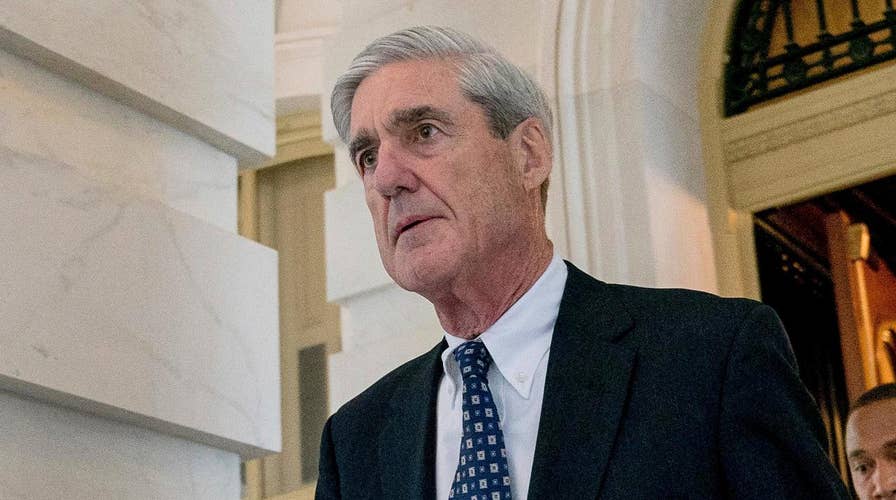Could special counsel's Russia probe be nearing conclusion?
President Trump's legal team expects that by the end of next week Mueller's interviews of White House aides will be completed; reaction from Robert Driscoll, former Justice Department official and deputy assistant attorney general under President George W. Bush.
A direct conflict between the U.S. and Russia is a daily threat.
Two months ago, the Pentagon accused Russia of dropping bombs dangerously close to American special operations forces in eastern Syria. The U.S. issued a stern warning. In response, Russia threatened to retaliate if its troops came under fire by the U.S.
The two nations use a “de-confliction” hotline every day to share information about their operations in Syria, as military officers seek to avoid a mistake or miscalculation that could ignite a full-scale war between them.
Such a conflict is something neither side may want, but its two leaders may be powerless to prevent it. Why? Because of Special Counsel Robert Mueller’s continuing investigation.
The longer the special counsel’s case drags on, the less likely it will be that President Trump and Russian President Vladimir Putin can sit down together in earnest to discuss key issues. These issues include diffusing the increasingly dangerous encounters in Syria, plus a myriad of other contentious topics that imperil American-Russian relations.
Gorbachev Issues Warning
Among those who are deeply concerned is Mikhail Gorbachev, the last leader of the Soviet Union. He recently described U.S.-Russia relations as having deteriorated into a “severe crisis,” warning that the nuclear arms control treaty that ended the Cold War is teetering on the precipice of collapse. Each side accuses the other of violating the terms of the treaty.
Writing in a Russian government newspaper, the former Soviet leader offered a dire prediction: “If the system of curbing nuclear arms crumbles, and that is exactly what the collapse of the INF (Intermediate-Range Nuclear Forces) treaty can lead to, the consequences will be catastrophic.”
Gorbachev urged Presidents Trump and Putin to hold a summit to address the alarming nuclear issue, calling it “totally abnormal” that such a meeting has yet to take place.
A summit meeting has not happened because there is legitimate concern in the White House that any friendly or conciliatory overture by President Trump toward Putin will surely be met by a hostile media. The media are predisposed to exploit any U.S.-Russian improvement in relations as incriminating evidence of Trump-Russia “collusion” which, however mistakenly, is a subject of Mueller’s investigation.
With no end in sight, the probe will linger as a critical impediment to warmer relations and a better mutual understanding that could avert the kind of cataclysmic conflict Gorbachev envisions and fears. Time is of the essence, and the clock is ticking.
Trump Wants Better Relations
During the 2016 election, and well before President Trump was ever accused of conspiring with Putin to influence the election, candidate Trump called for warmer relations with the Russian leader. At one campaign rally he asked: “If we could get along with Russia, wouldn’t that be a good thing, instead of a bad thing?”
Democratic presidential candidate Hillary Clinton predictably derided her opponent for embracing Putin, forgetting that she infamously presented a “reset button” to Russia while she was secretary of state and then failed to deliver on her promise. Hypocrisy has always been her strong suit.
Other than brief meetings on the sidelines of the G-20 summit in Germany in July and again during the more recent Pacific-Asia Economic Cooperation summit in Vietnam, Trump and Putin have had little direct contact. There have been a few phone calls, but nothing of any substance.
In August, Congress escalated tensions when it passed a sweeping package of sanctions against Russia for its election meddling, further alienating Putin.
The Russian leader immediately retaliated by ordering the U.S. to cut 755 people from the staff at its embassy in Moscow and at three consulates in other cities. That left a total staff of 455.
The reprisal prompted President Trump to observe: “Our relationship with Russia is at an all-time and very dangerous low. You can thank Congress.”
The diplomatic chill, dissension and concomitant danger will likely endure, as long as Mueller’s investigation languishes.
President Trump has reportedly received reassurance from White House lawyer Ty Cobb that the investigation will be finished by the end of the year. This is overly optimistic, notwithstanding a dearth of evidence that Trump ever conspired with Russia.
The Senate Intelligence Committee spent 10 months investigating alleged “collusion” and came up with no evidence whatsoever. Senior Obama administration intelligence officials who were privy to the investigations by the FBI, CIA and NSA are on record as saying they, too, saw no such evidence when they were in office.
Unless the special counsel accelerates the conclusion of his investigation, or otherwise reveals that there is no evidence of campaign “collusion” with Russia, relations between the two great nuclear powers could degrade to such a degree that armed conflict may become a frightening inevitability.
To put it plainly, Mueller’s investigation may be jeopardizing American lives. It is imperative that the probe be brought to a speedy conclusion.

